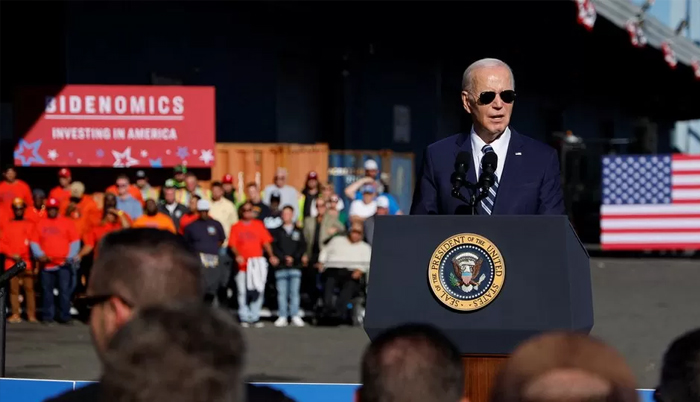![]() Home > America
Home > America
Biden Is Boosting Hydrogen But Some Are Unhappy

REUTERS | Joe Biden announces a $7bn (£5.7bn) investment in hydrogen hubs to combat climate change and create jobs
![]() October 16th, 2023 | 00:52 AM |
October 16th, 2023 | 00:52 AM | ![]() 1473 views
1473 views
UNITED STATES
US President Joe Biden is unveiling a $7bn (£5.7bn) investment in hydrogen hubs to combat climate change. So why are environmental groups sceptical?
On a visit to Philadelphia on Friday, Mr Biden announced the creation of seven regional hubs from Pennsylvania to California to help replace fossil fuels with cleaner-burning hydrogen.
The White House says the hubs, located in 16 states, will help cut carbon emissions equivalent to what more than 5.5 million gasoline-powered cars put into the air each year. The aim is to have the hubs produce around three million metric tons of hydrogen annually.
Hydrogen has a lot of green potential. When burned, it does not release the greenhouse gases that are warming the planet.
But Friends of the Earth, a leading environmental group, called the new initiative a "disappointing step".
A spokeswoman for the group, Sarah Lutz, said: "We need an ambitious transition away from dirty energy, not another taxpayer subsidy that enables Big Oil to repackage fossil fuels as so-called clean energy."
Lauren Pagel, policy director at the non-profit Earthworks, told AFP this initiative "is more about extending the life of oil and gas companies than addressing the climate crisis".
Julie McNamara, of the Union of Concerned Scientists, used softer language that still implied the policy may not help the environment, saying the US should ensure the hydrogen industry develops in a way "that is unequivocally aligned with our climate objectives".
The blowback comes down to how hydrogen power is made.
At the moment most hydrogen is extracted from natural gas in a process that emits a lot of carbon dioxide.
According to the Energy Department, 10 million metric tons are produced in the US each year. In comparison, US crude oil production is currently estimated at more than 700 million metric tons annually.
It is possible to make a cleaner type of hydrogen - often called green hydrogen - by using renewable energy. Wind turbines or solar panels can power electrolysers that split water into hydrogen and oxygen.
But that is much more expensive than using natural gas - as much as two or three times as costly - so the industry is reluctant to do it.
The environmental group Sierra Club only supports the use of green hydrogen and only under certain conditions.
It says that most current hydrogen projects "lock us in to continued fossil fuel use".
Some of the projects approved by Mr Biden promise to advance the use of green hydrogen, including the hub in California.
Others, though, focus on "blue hydrogen", which is produced with natural gas. The companies using this method try to reduce the climate impact through carbon capture, which essentially locks up the warming gases released and either re-uses or stores them, often underground or under the sea.
The idea is that this keeps the gases from reaching the atmosphere and from adding to the climate problem.
The proposed Appalachian hub, covering parts of Pennsylvania and West Virginia, promises to take that route.
But Sierra Club warns that carbon capture is not problem-free and could leak the potent warming gas methane into the atmosphere.
And some scientific research has cast doubt on how much blue hydrogen can help in reducing greenhouse gas emissions.
It suggests that the production of methane is a particular obstacle to treating blue hydrogen as a clean alternative to fossil fuels like oil and coal.
Source:
courtesy of BBC NEWS
by Georgina Rannard | BBC News Climate & Science
If you have any stories or news that you would like to share with the global online community, please feel free to share it with us by contacting us directly at [email protected]